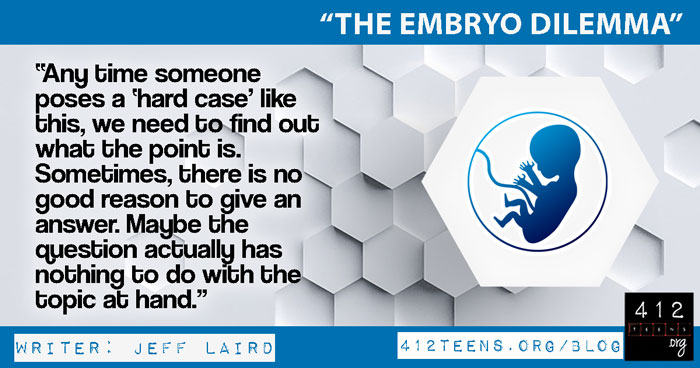The Embryo Dilemma: A Supposed "Shut Down" of the Pro-Life Argument

Posted by Jeff on 11-10-17
Social media recently spent a lot of time talking about a question that—supposedly—undoes the Bible's pro-life stance. Lots of people claim this question proves nobody really believes life begins at conception. The dilemma goes like this: You're in a fertility clinic, which is about to burn down, in a room with a five-year-old child and a cooler filled with 1,000 embryos. If you can only save one, which would you save?
First, we need to recognize when someone is not just telling us how we should think, but is actually trying to tell us what we think! That's pretty obnoxious, but it's exactly what this question, used against the pro-life cause, really does. It assumes that most people, in their gut, would have a certain reflex: of course, people would save the five-year-old. These folks THEN claim this proves that, deep down, we don’t actually think embryos are human beings.
When the Answer to the Question Proves Nothing
Does that make sense? Instead of falling for the emotion or the argument, take a step back and look at how the argument goes. Picking one means I don’t think the other side is human? Why? Says who? Does that mean a person who chooses the embryos doesn’t think the five-year-old is human? Looking at it that way, this dilemma doesn't look so convincing. In fact, it looks silly.
Just because a person chooses one or the other does not mean the one they left behind is worthless, or even worth "less." They aren't automatically saying there is "zero" value to the other side. Even by its own terms, this "burning clinic" argument proves literally nothing.
Any time someone poses a "hard case" like this, we need to find out what the point is. Sometimes, there is no good reason to give an answer. Maybe the question actually has nothing to do with the topic at hand. In this case, the choice between saving a five-year-old and saving 1,000 embryos has nothing to do with abortion.
How to Ask More Direct Questions...
Ask yourself: Is this really the situation we are presented with in the case of choosing or rejecting abortion? If not, then whatever choice we make isn’t something we can apply to the abortion debate.
Then, ask yourself this: Does being tempted to make a certain choice automatically mean that choice is the right one? Aren't there ever times when people act in the wrong way?
Also, give yourself enough time to realize that "hard questions" are "hard" for a reason. There are actually ways a person could argue for either option to be the "right" one. What if those are the only human embryos left on earth? What if the child has a fatal and highly contagious disease? What if it's YOUR child, or YOUR sibling, or those are YOUR embryos?
The Nature of a "Dilemma"
Of course, when we actually try to talk about these points, you can expect the normal responses. People will insist that all real, logical thinking must be brushed aside. They'll accuse you of dodging, but that's exactly what they are doing by asking you for an emotional response, then attributing your answer to something you "must" believe in the core of your being. By acting as if there is a crystal-clear lesson to be gained from that dilemma, they are dodging the fact that this is the nature of a "dilemma" in the first place!
This embryo dilemma is really just a re-hash of something called the "Trolley Problem," which has the same drawbacks. "Hard cases make bad law" is how this is usually phrased. That's the whole point of a dilemma: it forces us to pick between two seemingly bad options. This question about the burning fertility clinic proves neither a pro-choice nor pro-life argument. To say that the answer to a dilemma question would prove one's true heart on a matter completely misunderstands the concept of a "dilemma."
The way we answer that hard case doesn’t always apply to any other case. In the case of this question, if you admit you would probably save the five-year-old, that answer still has zero application to what you believe about the abortion issue. A woman faced with the decision to have an abortion or carry her pregnancy to full term is in an entirely different scenario than this question poses.
This is why Scripture calls on us not to be fooled by wrong-headed philosophies (Colossians 2:8) or silly arguments (1 Timothy 4:7). Many times, the easiest way to defuse an attack on the truth is simply to show how ridiculous the lie really is (John 3:20; Ephesians 5:13; 2 Corinthians 10:4-5).
That, you can do, if you don’t allow yourself to fall for the trick questions.
—Jeff


Writer: Jeff Laird
Jeff is a staff writer with Got Questions Ministries and used to be a mechanical engineer. When he's not accidentally setting things on fire in his workshop, or petting strange dogs, he loves helping people better understand God’s Word and how it applies to our lives. Jeff's calling is to untangle the "big picture" of Christian faith, making it easier to understand.
